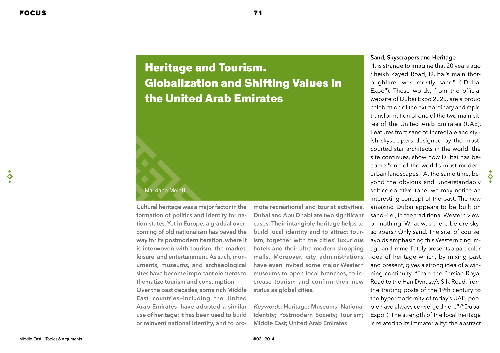Heritage and Tourism. Global Society and Shifting Values in the United Arab Emirates
Cultural heritage was a major factor in the formation of politics and identity for nation-states. Yet in Europe, a gradual overcoming of old nationalism has paved the way for its postmodern iteration, where it is interwoven with tourism, the market, leisure, and entertainment. As such, monuments, mu...
שמור ב:
| הוצא לאור ב: | Middle East - Topics & Arguments |
|---|---|
| מחבר ראשי: | |
| פורמט: | Artikel (Zeitschrift) Daten |
| שפה: | אנגלית |
| יצא לאור: |
Philipps-Universität Marburg
2014
|
| נושאים: | |
| גישה מקוונת: | צפיה ברשומה גישה מקוונת |
| תגים: |
אין תגיות, היה/י הראשונ/ה לתייג את הרשומה!
|
| סיכום: | Cultural heritage was a major factor in the formation of politics and identity for nation-states. Yet in Europe, a gradual overcoming of old nationalism has paved the way for its postmodern iteration, where it is interwoven with tourism, the market, leisure, and entertainment. As such, monuments, museums, and archaeological sites have become important elements to thematize tourism and consumption.Over the past decades, some rich Middle East countries—including the United Arab Emirates—have adopted a similar use of heritage: it has been used to build or reinvent national identity, and to promote recreational and tourist activities. Dubai and Abu Dhabi are two significant cases. Their intangible heritage helps to build local identity and to attract tourism, together with the cities’ luxurious hotels and their ultra-modern shopping malls. Moreover, city administrations have even invited some major Western museums to open local branches, to increase tourism and confirm their new status as global cities. |
|---|---|
| DOI: | 10.17192/meta.2014.3.2181 |
